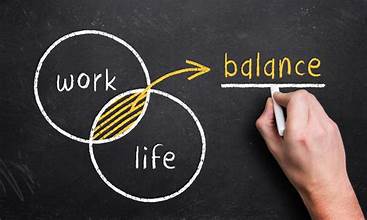In today’s fast-paced world, achieving a harmonious balance between work and personal life is more challenging than ever. However, it’s essential for not only maintaining mental and physical health but also enhancing productivity. This article delves into effective strategies for managing work-life balance and boosting productivity.
Understanding Work-Life Balance
Work-life balance is about dividing your time and energy between work and other important aspects of your life. It’s not just about spending less time at work but also about ensuring that time at work is productive and time outside of work is genuinely rejuvenating.
Setting Boundaries
The first step towards a balanced life is setting clear boundaries. This might mean designating specific work hours and sticking to them, or learning to say no to tasks that exceed your capacity. Remember, it’s okay to prioritize your well-being over additional work commitments.
Time Management Techniques
Effective time management is crucial. Techniques like the Pomodoro Technique, where work is broken down into intervals with short breaks, can significantly enhance focus and efficiency. Also, prioritizing tasks based on urgency and importance helps in managing time better.
Goal Setting and Review
Effective goal setting is another vital aspect of balancing work and life while remaining productive. Setting realistic, achievable goals can provide a clear sense of direction and purpose. Regularly reviewing these goals – both personal and professional – helps in keeping track of progress and making necessary adjustments. Celebrating small victories along the way can also boost morale and motivation.
Embracing Flexibility
Flexibility in work arrangements can greatly contribute to a better balance. This could mean telecommuting, flexible working hours, or part-time work. Such arrangements help in reducing stress and improving job satisfaction.
The Role of Technology
Leveraging technology can streamline work processes. From project management tools to automated software, technology can take over repetitive tasks, leaving you with more time for important work and life activities.
Maintaining Physical and Mental Health
A healthy body and mind are fundamental to productivity. Regular exercise, a balanced diet, and adequate sleep are non-negotiable for maintaining energy levels and focus. Techniques like mindfulness and meditation can help in managing stress and improving mental clarity.
Incorporating Mindfulness into Daily Routines
Incorporating mindfulness into everyday life can significantly enhance work-life balance. Mindfulness involves being fully present and engaged in the moment, which can improve concentration and reduce stress. Simple practices like mindful breathing or taking a few minutes to meditate during the workday can create a sense of calm and focus, leading to more productive work sessions and a more balanced state of mind.
The Importance of Regular Breaks
Regular breaks throughout the workday are crucial for maintaining productivity and avoiding burnout. These breaks shouldn’t just be physical rest periods but also opportunities to mentally recharge. Activities like a brief walk, listening to music, or engaging in a short hobby can provide a much-needed disconnect from work-related thoughts, thereby refreshing the mind.
Nurturing Relationships
Investing time in relationships is key to a fulfilling life. Whether it’s family, friends, or colleagues, strong relationships can provide support and happiness, which in turn can boost productivity at work.
Energy and Focus: Sustaining Productivity Throughout the Day
To maintain high productivity levels throughout the day, managing energy and focus is essential. This includes regular breaks, hydration, and nutritious meals. Some people also explore options like Le-Vel Thrive, a program that claims to boost energy and focus among its users. Additionally, short walks, power naps, and stretching exercises during the day can help in rejuvenating the mind and body.
Developing a Positive Mindset
Finally, maintaining a positive mindset is key to balancing work and life effectively. A positive outlook can help in managing stress and overcoming challenges. Cultivating gratitude, focusing on solutions rather than problems, and maintaining a hopeful attitude are practices that contribute to a healthier, more productive work and personal life. Developing resilience, the ability to bounce back from setbacks, is also integral to this positive mindset, allowing for a more harmonious and effective approach to life’s demands.
Continuous Learning and Growth
Personal and professional growth plays a vital role in work-life balance. Continuously learning new skills or hobbies can provide a sense of achievement and satisfaction, which translates into better work performance.
Creating a Supportive Work Environment
A supportive work environment is crucial for balance and productivity. This includes open communication, a positive culture, and support for employee wellbeing. Employers should recognize the importance of work-life balance in employee retention and productivity.
Conclusion: A Customized Approach
Achieving work-life balance and high productivity is a personalized journey. What works for one may not work for another. It’s important to experiment with different strategies and find what best suits your lifestyle and work demands. Remember, the goal is not just to be productive but also to enjoy a fulfilling life both at and away from work.


 Home
Home









